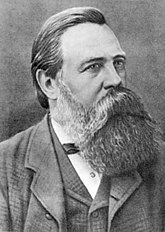Friedrich Engels

| Join the party! Communism |
| Opiates for the masses |
| From each |
| To each |
Friedrich Engels (1820-1895), a prominent Prussian-born communist philosopher and British industrialist, co-wrote (with Karl Marx) the Communist Manifesto, and used the profits from his Manchester textile mill to provide Marx with financial support during the writing of Das Kapital.
Despite his importance in the development of Marxism, Engels doesn't get a lot of mention outside discussions of the history of Marxism. Some people would account for this by claiming that he did the impossible and managed to be more boring than Marx; his The Condition of the Working Class in England (1845), which Engels wrote based on his experience in the course of running his mill,[citation needed] is sometimes cited as being even more boring[citation needed] than Das Kapital.
His Origin of the Family, Private Property, and the State (1884) had a large influence on the development of Marxist class theory and of historical determinism. Ironically, it drew mostly from Ancient Society (1877) by Lewis Henry Morgan,![]() an American capitalist railroad-tycoon and Republican politician.[notes 1]
an American capitalist railroad-tycoon and Republican politician.[notes 1]
See also
External links
Notes
- ↑ And feminist. And anti-Native. (No, really, politics were weird in the Gilded Age.)